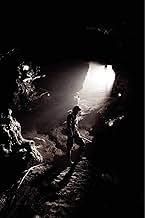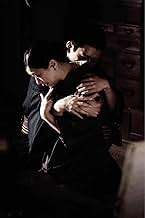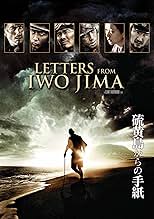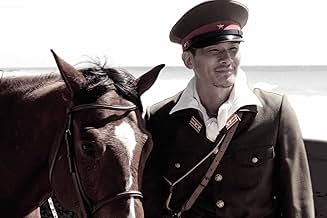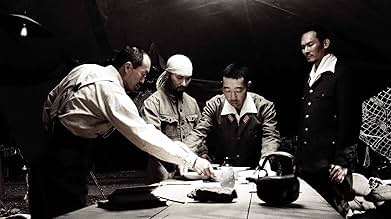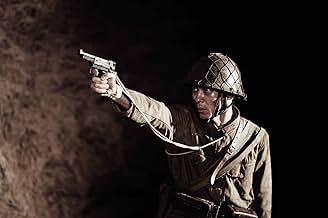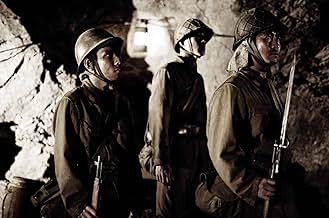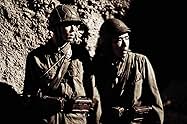La historia de la batalla de Iwo Jima entre los Estados Unidos y el Japón imperial durante la Segunda Guerra Mundial, contada desde la perspectiva de los japoneses que lucharon en ella.La historia de la batalla de Iwo Jima entre los Estados Unidos y el Japón imperial durante la Segunda Guerra Mundial, contada desde la perspectiva de los japoneses que lucharon en ella.La historia de la batalla de Iwo Jima entre los Estados Unidos y el Japón imperial durante la Segunda Guerra Mundial, contada desde la perspectiva de los japoneses que lucharon en ella.
- Dirección
- Guión
- Reparto principal
- Ganó 1 premio Óscar
- 25 premios y 39 nominaciones en total
Shidô Nakamura
- Lieutenant Itô
- (as Shidou Nakamura)
Luke Eberl
- Sam
- (as Lucas Elliot)
Sonny Saito
- Medic Endô
- (as Sonny Seiichi Saito)
Reseñas destacadas
Don't listen to the people who call this movie inaccurate or revisionist history.
The movie is accurate. There were people on both sides of the war who at times showed kindness.
Labeling all the Japanese soldiers as people who tortured POWS would be like saying all American soldiers in Vietnam killed and rape innocent Vietnamese. Or all American soldiers in Cuba tortured POWS from the wars in the Middle East. You can't group people together like that.
This movie shows better than any other film that there's really no good guys or bad guys when it comes to war. War is just pointless.
The movie is not supposed to be a documentary so the people who bash it for little details should go rent a documentary if thats what they want to see.
Also, Clint Eastwood deserves major credit for telling both sides of the war. Too many war movies always show the enemy as "heartless monsters" when it reality its never like that.
This is without a doubt the best movie of the year. Make sure you go see it.
The movie is accurate. There were people on both sides of the war who at times showed kindness.
Labeling all the Japanese soldiers as people who tortured POWS would be like saying all American soldiers in Vietnam killed and rape innocent Vietnamese. Or all American soldiers in Cuba tortured POWS from the wars in the Middle East. You can't group people together like that.
This movie shows better than any other film that there's really no good guys or bad guys when it comes to war. War is just pointless.
The movie is not supposed to be a documentary so the people who bash it for little details should go rent a documentary if thats what they want to see.
Also, Clint Eastwood deserves major credit for telling both sides of the war. Too many war movies always show the enemy as "heartless monsters" when it reality its never like that.
This is without a doubt the best movie of the year. Make sure you go see it.
I had previously watched the violent battle of Iwo Jima in two good movies: 1949 "Sands of Iwo Jima" and more recently in "Flags of Our Fathers". In both features, we see very well-choreographed battle scenes disclosed from the North American point of view, with the "heroism" of the American troops and the personal drama of a couple of soldiers and families, in the usual unilateral formula to reach great box offices in USA. Further, in these two movies, the enemy is nothing but evil and threatening one dimension shadows, using weapons to kill the brave marines.
However, "Letters from Iwo Jima" gives a totally different approach of war, unusual in Hollywood: it shows the human side of the enemies. In this film, the Japanese are also human beings, with different culture where they are prepared to die with honor, but people that love and are loved by someone, have families, wives and children, and fear and suffer with the insanities of war. In this aspect, I liked very much the pacifist perspective given by Clint Eastwood for the same battle, opening the eyes and hearts of viewers that probably were not able to understand this side of the Japanese (and other people) in a war. My vote is eight.
Title (Brazil): "Cartas de Iwo Jima" ("Letters From Iwo Jima")
However, "Letters from Iwo Jima" gives a totally different approach of war, unusual in Hollywood: it shows the human side of the enemies. In this film, the Japanese are also human beings, with different culture where they are prepared to die with honor, but people that love and are loved by someone, have families, wives and children, and fear and suffer with the insanities of war. In this aspect, I liked very much the pacifist perspective given by Clint Eastwood for the same battle, opening the eyes and hearts of viewers that probably were not able to understand this side of the Japanese (and other people) in a war. My vote is eight.
Title (Brazil): "Cartas de Iwo Jima" ("Letters From Iwo Jima")
Did it really last two and a half hours? It felt felt a lot shorter than that.
No, this is not an action war film with nonstop blood baths. It is a film that pulls the humanity out of the monster that is war.
This is one of, if not the best, movie ever directed by Clint Eastwood. I usually have a hard time following plots with many characters because they make me lose focus on the general story, but this one is done well. Not only am I engaged, I also become attached to every character and feel and understand their conflicts.
It does not matter who fights on the right or wrong side of WWII. This film goes beyond that. It is about what is right or wrong for the individual human being. It excels as a story about the human heart.
No, this is not an action war film with nonstop blood baths. It is a film that pulls the humanity out of the monster that is war.
This is one of, if not the best, movie ever directed by Clint Eastwood. I usually have a hard time following plots with many characters because they make me lose focus on the general story, but this one is done well. Not only am I engaged, I also become attached to every character and feel and understand their conflicts.
It does not matter who fights on the right or wrong side of WWII. This film goes beyond that. It is about what is right or wrong for the individual human being. It excels as a story about the human heart.
10max-745
I have watched this film twice already this week (first week of release here in Japan). I am an American living in Japan for the past twenty two years and have yet to see such a strong performance from an (almost) all-Japanese cast. This movie draws you into the caves and makes you a part of the Japanese soldier's life. The main characters all have an interesting story to tell. But in the end the message is clear. War is futile.
The strangest part of all. Clint Eastwood has made a Japanese movie that the Japanese should have made. There is almost no way to tell it was a "foriegn" production until you see the credits.
The strangest part of all. Clint Eastwood has made a Japanese movie that the Japanese should have made. There is almost no way to tell it was a "foriegn" production until you see the credits.
At the conclusion of the film a person behind me said, "Incredible," twice. Another person followed with, "A masterpiece." I would concur. Perhaps it isn't a perfect film but it is a movie with great impact. I find that it is a testament to the skill of Clint Eastwood as a director and Iris Yamashita as screenwriter that some of the scenes that had the greatest impact were of minor thingsa letter read out loud, the way someone saluted, a tear, a song...
There were no clear cut heroes or villains beyond "war" itself. I'm reminded of that saying, "No one wins a war. One side simply loses more than the other." War diminishes us all. We must learn to turn our backs on such endeavors even if it means that the military/industrial death merchants take a cut in profits or that they truly learn to hammer swords into plow shares.
If the film were to depict the battle in a manner that was realistically experienced by the soldiers the film would be unbearable to any viewer. One must see the battle and history as a kind of allegorical backdrop to a story about the utter inhumanity and futility of war. As a film it had to illustrate the overall societal insanity of war through a human lens, and it did this in a deeply moving way.
There were no clear cut heroes or villains beyond "war" itself. I'm reminded of that saying, "No one wins a war. One side simply loses more than the other." War diminishes us all. We must learn to turn our backs on such endeavors even if it means that the military/industrial death merchants take a cut in profits or that they truly learn to hammer swords into plow shares.
If the film were to depict the battle in a manner that was realistically experienced by the soldiers the film would be unbearable to any viewer. One must see the battle and history as a kind of allegorical backdrop to a story about the utter inhumanity and futility of war. As a film it had to illustrate the overall societal insanity of war through a human lens, and it did this in a deeply moving way.
¿Sabías que...?
- CuriosidadesShot back-to-back with Banderas de nuestros padres (2006).
- PifiasThe bottle of Johnnie Walker appears to have a screw cap made of aluminum. At that time liquor bottles had a cork stopper.
- Citas
General Tadamichi Kuribayashi: If our children can live safely for one more day it would be worth the one more day that we defend this island.
- Banda sonoraString Quartet No.6, Op. 1-6, Hob. III-6, Mov.2
Composed by Joseph Haydn
At a party where Ken Watanabe participated
Selecciones populares
Inicia sesión para calificar y añadir a tu lista para recibir recomendaciones personalizadas
Detalles
- Fecha de lanzamiento
- País de origen
- Sitios oficiales
- Idiomas
- Títulos en diferentes países
- Cartes des d'Iwo Jima
- Localizaciones del rodaje
- Empresas productoras
- Ver más compañías en los créditos en IMDbPro
Taquilla
- Presupuesto
- 19.000.000 US$ (estimación)
- Recaudación en Estados Unidos y Canadá
- 13.756.082 US$
- Fin de semana de estreno en EE. UU. y Canadá
- 89.097 US$
- 24 dic 2006
- Recaudación en todo el mundo
- 68.673.228 US$
- Duración
- 2h 21min(141 min)
- Color
- Mezcla de sonido
- Relación de aspecto
- 2.39 : 1
Contribuir a esta página
Sugerir un cambio o añadir el contenido que falta







